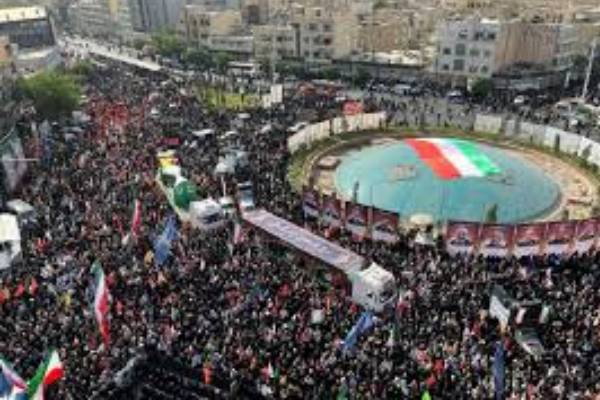Coffins draped in Iranian flags and bearing portraits of the deceased lined the streets, flanked by crowds chanting slogans and waving flags. The government had shut down public offices and provided free transport to facilitate turnout, amid a widespread media campaign urging public participation.
Among those buried were General Mohammad Bagheri, Iran’s highest-ranking military officer and Chief of Staff of the Armed Forces, along with his wife and daughter, who were killed in an Israeli airstrike. High-ranking officials such as Revolutionary Guards commander Hossein Salami and nuclear physicist Dr Mohammad Mehdi Tehranchi, head of Tehran’s Azad University, were also laid to rest.
State television showed President Masoud Pezeshkian and Rear Admiral Ali Shamkhani — an adviser to Supreme Leader Ayatollah Ali Khamenei who was injured in an earlier Israeli strike — attending the funeral. Iran has officially reported 627 deaths in the conflict, while Israeli authorities say 28 of their citizens were killed in retaliatory missile attacks from Tehran.
The funeral follows a ceasefire brokered earlier this week after US forces joined Israeli efforts and launched airstrikes on key Iranian nuclear sites. While Washington has claimed significant success in crippling Iran’s nuclear capacity, the International Atomic Energy Agency (IAEA) says the full extent of the damage remains unclear. Director General Rafael Grossi has warned that Iran could resume enrichment activities “in a matter of months,” and stressed that diplomacy, not military action, remains the only sustainable solution.
Meanwhile, tensions have escalated again following inflammatory remarks from former US President Donald Trump. In a series of posts on his Truth Social platform, Trump said he had saved Supreme Leader Khamenei from death and criticised him for claiming victory. Trump also claimed he had been considering sanction relief for Iran, but halted those plans after Khamenei’s defiant remarks.
Iran’s Foreign Minister Abbas Araghchi responded sharply, warning Trump against “disrespectful” rhetoric. He accused the former president of undermining any chance of renewed diplomatic engagement and insisted the Iranian people would not tolerate insults toward their leaders.
Araghchi also acknowledged “excessive and serious” damage to Iran’s nuclear sites, though Khamenei has insisted the strikes achieved “nothing significant”. Iran’s parliament has since voted to suspend cooperation with the IAEA, deepening the diplomatic standoff.
As the dust settles, regional observers warn that the ceasefire remains fragile, with rhetoric on all sides threatening to reignite tensions. While Washington and Tel Aviv argue their actions were necessary to halt Tehran’s nuclear ambitions, Iranian officials continue to insist their programme is peaceful — and that the war only strengthened domestic resolve.





